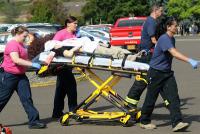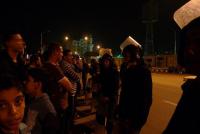-
Mass trauma’s emotional toll can disrupt children’s sense of competence
Traumatic events can have a profound effect on communities. Whether it is a terrorist attack or a natural disaster, such as a hurricane or tornado, the aftermath can have lasting effects, especially on children. How children respond in the wake of mass traumatic events is related to their perceptions of competence – or how they view their ability to control a situation. An overwhelming challenge, such as a natural disaster or a terrorist attack, can disrupt the development of that sense of well-being.
-
-
Tipping points: When natural or social systems reach a point of no return
A tipping point is a critical threshold at which a dynamical system undergoes an irreversible transformation, typically owing to a small change in inputs or parameters. This concept is very broad and can refer to the extinction of an animal or a plant species, the depletion of a water source, or the financial collapse of an institution, among many other natural and social phenomena. Researchers provide a better understanding of the characteristics of this point of no return and what happens to a system after its occurrence.
-
-
Bee colonies-inspired tool to help dismantle terrorist cells, criminal social networks
Researchers have designed an algorithm, inspired by the intelligent and social behavior of bee colonies, which allows law enforcement to attack and dismantle any type of social network that poses a threat, whether physical or virtual, such as social networks linked to organized crime and jihadist terrorism. The possible applications of this new bio-inspired algorithm, which helps to make optimal decisions in order to dismantle any type of social network, are many and varied: from dismantling a criminal network to facilitating the design of vaccination strategies capable of containing the spread of a pandemic.
-
-
As the world ends, people remain calm and prosocial: Video-game study

As the world ends, will you lock arms and sing “Kumbayah” or embark on a path of law-breaking, anti-social behavior? A new study, based upon the virtual actions of more than 80,000 players of the role-playing video game ArcheAge, suggests you will be singing. “We realize that, because this is a video game, the true consequences of the world ending are purely virtual. That being said, our dataset represents about as close as we can get to an actual end-of-the-world scenario,” says one researcher.
-
-
How political science helps combat terrorism
Richard Nielsen, an MIT expert on Islamic terrorism, estimates that about 10 percent of Muslim clerics on the Internet are jihadists. “I don’t know if this number should strike readers as high or low; it’s higher than I expected,” he says. The question he tackles is the internet changing the nature of religious authority in Islam? “The problem of modern jihadism is rooted in an ongoing crisis of Islamic authority brought about by the rise of media — first print, then cassette tapes, and now the online Fatwa Bank.” He adds that data show that the odds of dying violently are lower now than they’ve ever been. “This isn’t to say that terrorism isn’t a problem, but we should keep the true level of threat posed by terrorism in perspective.”
-
-
Psychological “vaccine” could immunize public against fake news on climate change
New research finds that misinformation on climate change can psychologically cancel out the influence of accurate statements. However, if legitimate facts are delivered with an “inoculation” – a warning dose of misinformation – some of the positive influence is preserved.
-
-
Presidential candidates may be psychopaths – but this is not necessarily a bad thing
Oxford University’s Dr. Kevin Dutton has spent much of his career looking at psychopaths and researching psychopathic traits, identifying those which can be of benefit and those which can lead to incarceration. He contends that being a psychopath is not an all-or-nothing affair. Instead, psychopathy is on a spectrum along which each of us has our place. In a new study, Dutton finds that Donald Trump ranks above Adolf Hitler and only just below Idi Amin, Saddam Hussein, and Henry VIII. Hillary Clinton ranks between Napoleon and Nero.
-
-
Applying public health models to gun violence

Research treats shootings like an epidemic — by applying public health models. Data indicate an individual’s odds of being a gunshot victim increase with exposure to gun violence. The work focuses not on mass shootings or isolated incidents of violence – rather, the researchers have worked to gather data on populations that face persistent threats of gun-related attacks and homicides, often connected to gang and drug activity.
-
-
Post-conflict reconciliation led to societal healing, but worsened psychological health
Civil wars divide nations along social, economic, and political lines, often pitting neighbors against each other. In the aftermath of civil wars, many countries undertake truth and reconciliation efforts to restore social cohesion, but little has been known about whether these programs reach their intended goals. A new study suggests reconciliation programs promote societal healing, but that these gains come at the cost of reduced psychological health, worsening depression, anxiety, and trauma.
-
-
Calls for banning Muslims from entering U.S. impractical, harmful: Expert

Duke sociologist Christopher Bail, who studies how anti-Muslim organizations use social media, says that calls to ban immigration of Muslims to the United States are missing two important points. First, there is no conceivable mechanism whereby the United States could identify Muslims — short of visual cues such as headdress or religious garb, which are not worn by most Muslims. Second, and perhaps more importantly, it is surprising that people think that groups such as ISIS could not disguise terrorists they want to send to the United States as non-Muslims.
-
-
Predicting political surprises, uprisings before they happen
From the Arab Spring to the successful leadership bid by Jeremy Corbyn or Donald Trump’s success in the U.S. Republican campaign: Why are so many surprising things happening in politics? New research has harnessed a wealth of digital data and techniques to try to answer this question.
-
-
Large-scale conspiracies would quickly reveal themselves

If you are thinking of creating a massive conspiracy, you may be better scaling back your plans, according to new research. While we can all keep a secret, a new study suggests that large groups of people sharing in a conspiracy will very quickly give themselves away.
-
-
Terrorism pushes liberals to think more like conservatives

Liberals’ attitudes in the United Kingdom toward Muslims and immigrants became more like those of conservatives following the 7 July 2005 bombings in London, new research shows. Data from two nationally representative surveys of British citizens revealed that feelings of national loyalty increased and endorsement of equality decreased among political liberals following the terrorist attack. “Our findings show that terrorism shifts public attitudes towards greater loyalty to the in-group, less concern with fairness, and greater prejudice against Muslims and immigrants, but it seems that this effect is stronger on those who are politically left-leaning than those who are right-leaning,” explained one of the researchers.
-
-
No rise in anti-Muslim sentiment in U.K. in wake of Paris attacks: Poll

Last month’s terrorist attacks in Paris appear not to have led to a rise in anti-Muslim sentiment in Britain, a new study has shown. The new research comes amid concerns that Western public opinion may grow more hostile toward Muslims, as evidenced by the success of the Front National in the first t round of France’s regional elections three weeks ago, and the apparent popularity of Republican presidential candidate Donald Trump, who has called for a ban on Muslim immigration to the United States.
-
-
The mind of a cyberterrorist, a neglected aspect of cybersecurity
A new study is delving into an aspect of cybersecurity rarely explored before now: the human component. The reason why this topic is lesser known, a leading expert says, is that security professionals become very focused on the technological side of responding to attacks and lack the social psychology background to analyze and understand the human being on the other side of that attack.
-
- All
- Regional
- Water
- Biometrics
- Borders/Immig
- Business
- Cybersecurity
- Detection
- Disasters
- Government
- Infrastructure
- International
- Public health
- Public Safety
- Communication interoperabillity
- Emergency services
- Emergency medical services
- Fire
- First response
- IEDs
- Law Enforcement
- Law Enforcement Technology
- Military technology
- Nonlethal weapons
- Nuclear weapons
- Personal protection equipment
- Police
- Notification /alert systems
- Situational awareness
- Weapons systems
- Sci-Tech
- Sector Reports
- Surveillance
- Transportation
Advertising & Marketing: advertise@newswirepubs.com
Editorial: editor@newswirepubs.com
General: info@newswirepubs.com
2010-2011 © News Wire Publications, LLC News Wire Publications, LLC
220 Old Country Road | Suite 200 | Mineola | New York | 11501
Permissions and Policies
Editorial: editor@newswirepubs.com
General: info@newswirepubs.com
2010-2011 © News Wire Publications, LLC News Wire Publications, LLC
220 Old Country Road | Suite 200 | Mineola | New York | 11501
Permissions and Policies
